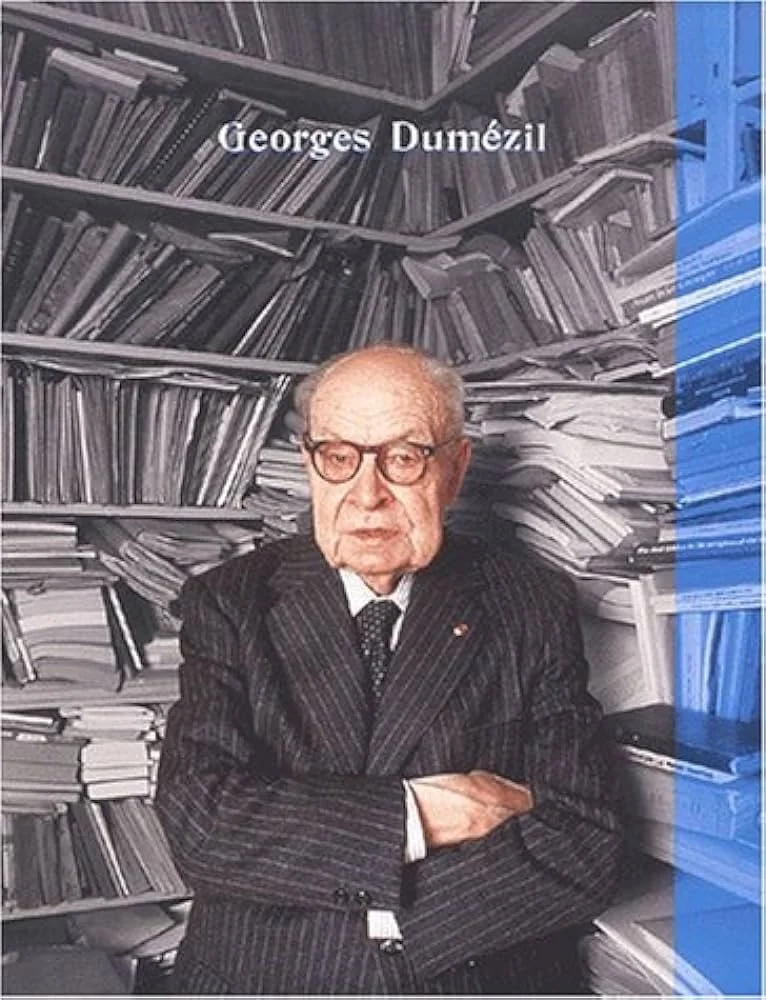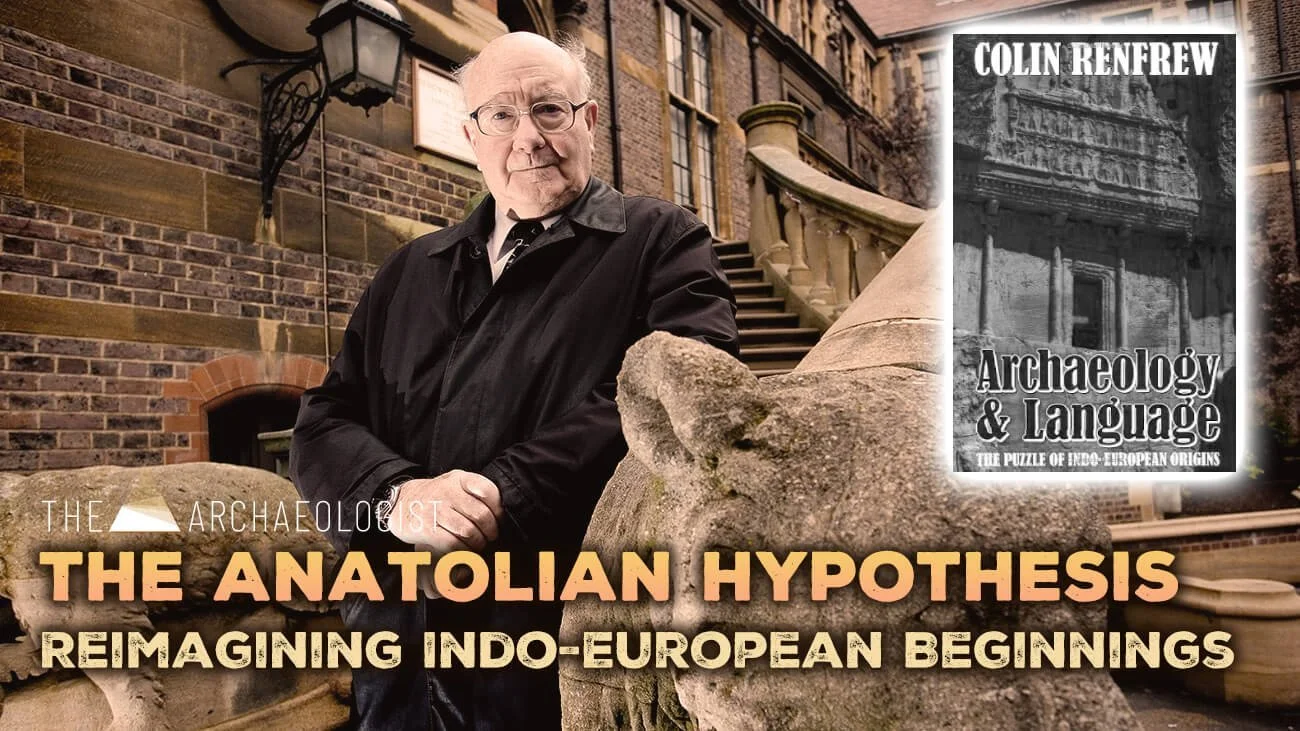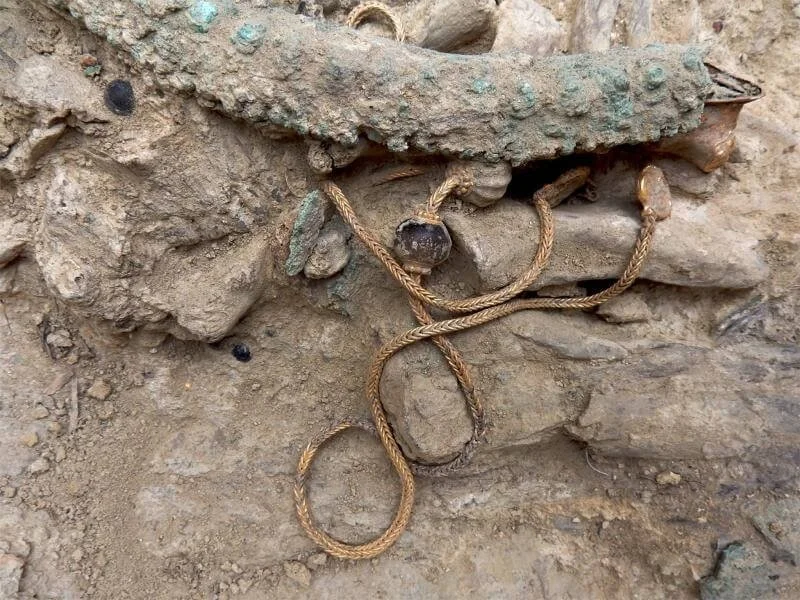Georges Dumézil (1898–1986) was a French academic and comparative mythologist whose work fundamentally altered our understanding of Indo-European societies and their mythologies.
Early Foundations: Education and the Making of a Mythologist
His education commenced at the Lycée Louis-le-Grand and proceeded to the École Normale Supérieure in Paris, where he specialized in classics and linguistics. Dumézil's academic journey was characterized by a deep interest in languages and ancient texts, which led him to master several European and ancient languages. His doctoral thesis on the Uzbek language and folklore marked a turning point in his career, laying the groundwork for his future contributions to comparative mythology and historical linguistics. His academic pursuits were complemented by teaching positions at various prestigious institutions, eventually culminating in his role as a professor at the Collège de France, a position that provided him with a significant platform to advance his research and theories.
Throughout his illustrious career, Dumézil was known for his innovative methodologies and interdisciplinary approaches, traversing the fields of linguistics, anthropology, and history to explore the commonalities among Indo-European societies. His scholarly work was not confined to the academic realm alone; it also took him on numerous field trips across Europe and Asia, enriching his research with firsthand observations of diverse cultures and languages. This broad exposure was instrumental in shaping his theoretical framework, allowing Dumézil to draw parallels and make connections that others had overlooked. His contributions to the academic community were recognized through various accolades and memberships in learned societies, cementing his legacy as a pioneering figure in the study of ancient civilizations and their mythologies.
Dumézil is well known for his formulation of the trifunctional hypothesis on Proto-Indo-European mythology and society. His research has had a major influence on the fields of comparative mythology and Indo-European studies.
The Trifunctional Framework: Deciphering Proto-Indo-European Society
Georges Dumézil's trifunctional hypothesis proposed a common structure underlying the mythologies and societies of Proto-Indo-European peoples, consisting of three distinct social functions: sovereignty, warfare, and productivity. This innovative framework was first introduced in the 1920s and further developed throughout his career. According to Dumézil, the first function pertains to religious and judicial sovereignty, embodied by deities and figures associated with law, order, and spiritual authority. The second function revolves around physical prowess and warrior nobility, representing the martial aspect of society. The third and final function concerns fertility, wealth, and the wellbeing of the community, often associated with craftsmen, farmers, and other productive roles. Dumézil's hypothesis was built upon a meticulous examination of myths, legends, and historical texts from various Indo-European cultures, identifying recurring motifs and characters that corresponded to these three functions.
The expansion of Dumézil's trifunctional hypothesis over the years was not just a scholarly endeavor but a monumental shift in the understanding of ancient societies. It offered a new lens through which to interpret the complexities of Indo-European mythology, suggesting a shared ancestral culture that predated recorded history. Dumézil's comparative method, which drew parallels across a wide range of Indo-European languages and traditions, from the Roman pantheon to the Norse sagas, further enhanced this perspective. His work, encapsulated in numerous publications and lectures, became a cornerstone of Indo-European studies, influencing not only mythologists but also historians, linguists, and anthropologists. The hypothesis was instrumental in fostering interdisciplinary research and dialogue, encouraging scholars to explore the interconnections between mythology, language, and social structure in ancient societies.
Georges Dumézil started to doubt the universalist viewpoints put forth by individuals like Durkheim and Lévi-Strauss as a result of reading works by his colleague Wikander. This skepticism led him to argue that the trifunctional structure was a unique attribute of Indo-European societies, distinguishing it from the social organizations of other cultures. Dumézil's engagement with the languages and mythologies of various indigenous peoples in the Americas reinforced his belief that trifunctionalism was not a widespread phenomenon. Consequently, he refined his interpretation of the Indo-European social structure, coming to view it less as a rigid system and more as a guiding ideology.
During a stint in 1955 as a visiting professor at the University of Lima, Dumézil immersed himself in the study of Quechua language and mythology, deepening his comparative analysis. Throughout the 1950s, his research explored the hypothesis of a mythical conflict among the different societal functions within Indo-European mythology. Dumézil theorized that this conflict eventually led to the assimilation of the third function by the first and second functions, highlighting a dynamic process of ideological evolution and integration within Indo-European societies.
This part of the 12th-century Swedish Skog tapestry has, possibly erroneously, been interpreted to show, from left to right, the one-eyed Odin, the hammer-wielding Thor and Freyr holding up wheat. Terje Leiren believes this grouping corresponds closely to the trifunctional division.
Navigating Criticism and Controversy: A Scholar's Legacy Reexamined
Georges Dumézil's work, and particularly his trifunctional hypothesis, have not been without criticism. Some scholars have challenged the universality of the tripartite division, arguing that it oversimplifies the complex and varied nature of Indo-European societies and mythologies. Critics have pointed out instances where Indo-European cultures do not neatly fit into the three-fold model, suggesting that Dumézil's framework may be more of an idealized construct than a reflection of historical reality. Additionally, Dumézil's methodology, which frequently involves viewing myths through the prism of his hypothesis, has come under fire for being somewhat circular and potentially causing confirmation bias in his analyses.
Dumézil faced criticism from specialists in various fields, including Indology, Iranology, and Roman studies. Prominent among his critics was Indologist Paul Thieme, who contended that the deities of the Mitanni were specifically Indo-Aryan, challenging Dumézil's interpretation of them as Indo-Iranian. This critique called into question Dumézil's broader reconstructions of Indo-Iranian religious practices. Despite such criticisms, Dumézil engaged actively with his detractors and persistently refined his theoretical framework in response to new insights and challenges.
Georges Dumézil Amid Political Criticism and Defense
Carlo Ginzburg accused Georges Dumézil of showing a preference for Nazi culture through his studies on Germanic and Indo-European religions, suggesting Dumézil aimed to undermine Judeo-Christian values. In the 1980s and 1990s, some scholars, particularly from the Marxist left, labeled Dumézil as secretly supporting fascist ideas and promoting a return to traditional European hierarchies through his academic work. They noted his connections to Pierre Gaxotte, a known supporter of the conservative Action Française, and highlighted how figures from the European New Right, such as Alain de Benoist and Jean Haudry, used Dumézil's theories to back far-right ideologies, portraying the Indo-Europeans (and by extension, white people) as superior.
Carlo Ginzburg charged Dumézil with having "sympathy for Nazi culture" for his works on Germanic and Indo-European religion, and accused Dumézil of conspiring to undermine "Judeo-Christian" values.
Despite these accusations, it's important to note that Dumézil opposed Nazism, voiced concerns about German nationalism, and never officially joined Action Française due to ideological differences. Moreover, Dumézil was a Freemason, which led to his dismissal from teaching and civil service positions by the Vichy government during World War II. Critics, including some who admired Lévi-Strauss's work, argued that the social and mythological patterns Dumézil associated with Indo-Europeans were universal, not unique. Colin Renfrew, for example, questioned the distinctiveness of Indo-European cultures beyond their language. Arnaldo Momigliano was particularly harsh, also condemning Dumézil for allegedly promoting Nazi cultural sympathies in his 1930s works on Germanic religion and for aligning his trifunctional hypothesis with fascist ideologies.
Nevertheless, Dumézil received staunch defense from many colleagues who saw the criticism as politically motivated rather than scholarly. Dumézil himself robustly refuted the accusations, clarifying that he had never supported fascist ideologies nor found the ancient Indo-European social structures appealing. He expressed a preference for a dynastic principle over the unpredictability of general elections, citing the stability of northern European monarchies as examples. This defense highlighted Dumézil's attempt to distance himself from the political controversies associated with his work.
Colin Renfrew's Archaeological and Anthropological Challenge to Dumézil's Trifunctional Hypothesis
In his critique of Georges Dumézil's trifunctional hypothesis, Colin Renfrew presents a compelling argument grounded in archaeological and anthropological evidence, challenging the historical veracity of Dumézil's model. Renfrew points out that the hierarchical societal structure described by Dumézil, characterized by three distinct social functions, is typically associated with state societies known for their complex institutions. However, Renfrew argues that the archaeological record of the 3rd millennium does not support the existence of such intricate social organizations among early Indo-European peoples. Specifically, he highlights the Kurgan cultures, which do not exhibit the characteristics of state societies, and the material culture of these people lacks evidence of the significant hierarchical distinctions found in chieftain societies. Moreover, when considering the first farmers of Europe in the 6th and 5th millennia BC, who are often suggested as the earliest Indo-European speakers, Renfrew emphasizes their societal organization as egalitarian, further contradicting Dumézil's framework.
Renfrew's critique extends to Dumézil's interpretation of historical reality, suggesting that Dumézil's system struggles with inconsistencies and lacks clarity on the practical implications of his tripartite divisions. This, Renfrew argues, undermines the foundational premise of Dumézil's hypothesis, casting doubt on its historical accuracy. The emergence of stratified societies and analogous social institutions in regions like India, Rome, and Gaul by the 1st century BC, according to Renfrew, does not necessarily indicate a common societal structure extending back to 2000 or 4000 BC. The absence of a clear depiction of this ancestral society, its timeline, and geographical setting poses a significant challenge to the historical foundation of Dumézil's theory.
Renfrew also critiques the assumption of a shared heroic element across early Indian, Greek, Celtic, and Norse societies, suggesting that similar social characteristics in disparate cultures do not confirm a common origin. Renfrew's references to Ernest Gellner and R.I. Page, who criticized the structuralist perspectives of Dumézil and Lévi-Strauss, support this argument. Lévi-Strauss, in particular, attributed structural similarities to more general factors rather than to a specific historical lineage, further complicating the acceptance of Dumézil's hypothesis.
Map of the spread of farming into Europe up to about 3800 BC
Adding to the debate, Renfrew cites examples that question the exclusivity and specificity of Dumézil's Indo-European model. John Brough's satirical analysis demonstrates the applicability of the tripartite system to non-Indo-European texts, such as the Old Testament, challenging the hypothesis's uniqueness. Similarly, Atsuhido Josida's (one of Dumezil's most ardent supporters and students) research into early Japanese mythology reveals structural parallels with the Indo-European three-function ideology, yet Dumézil's explanation of these similarities through historical contact between Scythian nomads and non-Indo-European populations in Korea and Japan is seen as speculative and not accepted by experts.
In essence, Renfrew's critique not only questions the historical accuracy and methodological soundness of Dumézil's trifunctional hypothesis but also emphasizes the importance of a more nuanced and evidence-based approach in interpreting the social structures of ancient societies.
Georges Dumézil's work has left an indelible mark on the fields of comparative mythology, linguistics, and the study of Indo-European cultures, embodying a pioneering spirit that sought to uncover the underlying structures of ancient societies. His formulation of the trifunctional hypothesis provided a groundbreaking framework through which scholars could analyze and compare the mythologies and social organizations of Indo-European peoples. By positing that these societies were structured around three distinct functions—sovereignty, warfare, and productivity—Dumézil offered a lens that brought into focus the shared cultural heritage and ideological underpinnings of a diverse linguistic family.
Despite the accolades and the transformative impact of his work, Dumézil's career was not without controversy. His political affiliations and the interpretations of his work in the context of broader ideological movements provoked heated debates among scholars. The criticisms leveled against him, ranging from allegations of sympathizing with extremist ideologies to questions about the universal applicability of his theories, underscore the complex interplay between academic scholarship and the socio-political milieu in which it exists. Yet, it is also clear that Dumézil engaged with these criticisms, continuously refining his theories in light of new evidence and perspectives.
The legacy of Georges Dumézil is characterized by an enduring relevance to interdisciplinary studies, inspiring subsequent generations of scholars to explore the connections between myth, language, and social structure. While debates over his methods, conclusions, and political views have certainly shaped the reception of his work, they also underscore the vibrancy and importance of critical engagement in the humanities. Dumézil's contributions extend beyond the confines of academia, challenging us to consider the depths of human cultural expression and the intricate ways in which our societies are constructed and understood. In the final analysis, Dumézil's work embodies the quest for knowledge about the past and its profound implications for our understanding of human culture and identity.














